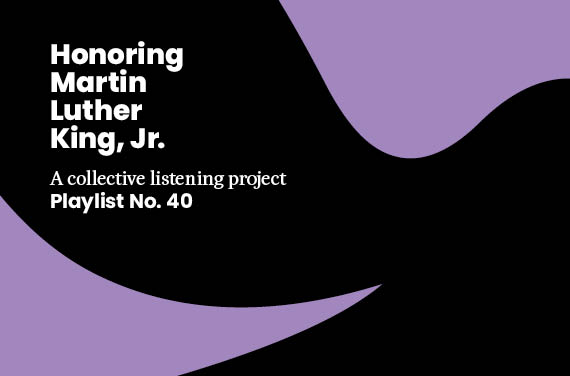Welcome to our season!
Collective Listening Project
Honoring Martin Luther King Jr.
Playlist No. 40
About the Playlist
January 14, 2021

In honor of the Reverend Dr. Martin Luther King Jr.’s 92nd birthday, this week’s Collective Listening Project features a diverse playlist celebrating his life and work with music that both inspired and was inspired by this extraordinary preacher, organizer, and Nobel Laureate. Dr. King lived a remarkable life dedicated to civil rights justice and racial harmony in which music played an instrumental role.
Dr. King grew up in the Baptist church, embraced by its traditions of hymns, spirituals, and gospel songs. He was a violinist and sang tenor; his mother Alberta was an organist and choir director; and his wife Coretta studied voice and piano in college at New England Conservatory. In his own writings, Dr. King recognized music as an “instrument of change” and “the soul of the [Civil Rights] movement.”
Traditional Spiritual “He’s Got the Whole World in His Hands”
Perhaps best known for his “I have a dream” speech, delivered in front of 250,000 civil rights marchers in Washington on August 28, 1963, including many musical artists, including: Harry Belafonte; Peter, Paul, and Mary; Mahalia Jackson; and Bob Dylan. The legendary Marian Anderson returned to the steps of the Lincoln Memorial to sing “He’s Got the Whole World.”
Dorsey, Thomas A. (1899–1993) “Precious Lord, Take My Hand” (1932)
Written by a grieving Dorsey at the death of his wife, “Precious Lord” was reportedly King’s favorite song. Minutes before his assassination in Memphis on April 4, 1968, King had asked saxophonist Ben Branch to play it at an event they were both scheduled to attend later that evening. The “Queen of Gospel” Mahalia Jackson sang it at his funeral.
Dvořák, Antonín (1841–1904) “Largo” from Symphony No. 9 in E minor, “From the New World”, Op. 95 (1893)
As Czech folk music had inspired his compositions, Dvořák was inspired to discover a parallel repertoire while he taught and composed in the United States. Composer Harry Burleigh taught Dvořák the African American Spirituals, which inspired many musical themes in his Symphony 9, “From the New World.” The “Largo” was played at King’s funeral.
Taylor, Gene (1929–2001) and Nina Simone (1933–2003) “Why? (The King of Love Is Dead)” (1968)
Written and premiered only three days after King’s assassination, “Why?” has been described as “the saddest song ever written.” A singer, pianist, and civil rights activist, Simone said at that time, “We can’t afford any more losses—They’re killing us one by one.”
Berio, Luciano (1925–2003) O King (1968)
Originally written as the second movement of his longer work “Sinfonia,” Berio arranged this piece that “employs the phonemes of King’s name, rather than elegiac text, in creating a gentle tribute to the man.” It was commissioned and premiered by the New York Philharmonic and its conductor Leonard Bernstein in 1968.
Brubeck, Dave (1920–2012) “Shout unto the Lord” from Gates of Justice (1969)
Jointly commissioned by the University of Cincinnati College—Conservatory of Music and the Union of American Hebrew Congregations, American jazz pianist and composer Dave Brubeck was inspired by texts from the Old Testament and from speeches by King. This recording features Brubeck himself, his trio, and Princeton University Department of Music’s own Kevin Deas as the baritone “whose melodies stem from the blues and spirituals, is the symbol of contemporary man, and a reminder to men of all faiths that divine mandates are still waiting to be fulfilled.”
Ellington, Edward (“Duke”) (1899–1974) Three Black Kings (1974)
Following movements inspired by two biblical kings (Balthasar, King of the Magi and King Solomon), Martin Luther King Jr. is the subject of the third and final movement in this musical eulogy by yet another member of the royalty: composer, pianist, and conductor “Duke” Ellington.
Singleton, Alvin (b. 1940) After Fallen Crumbs (1987)
Singleton attended New York University and Yale and later studied in Europe as a Fulbright Scholar. After living and working in Europe for fourteen years, Singleton returned to the United States to become Composer-in-Residence with the Atlanta Symphony Orchestra, for whom he composed After Fallen Crumbs in memory Martin Luther King.
Taylor, James (b. 1948) “Shed a Little Light” (1991)
Taylor dedicated this piece to Martin Luther King Jr. “on the occasion of the holiday in which we recognize him and his gift to us all.” Describing King as “the greatest hero of our time…moved by the injustice in this world to do something about it,” Taylor wrote the song as a prayer, in recognition of the things we hold in common, regardless of surface differences.
Jarrett, Keith (b. 1945) Bridge of Light (1994)
Written in 1994 in honor of King, Bridge of Light features a solo viola amongst shimmering orchestral tones, which Jarrett described as “born of a desire to praise and contemplate rather than a desire to ‘make’ or ‘show’ or ‘demonstrate’ something unique.”
Reagon, Bernice Johnson (b. 1942) “Letter to Dr. Martin Luther King, Jr.” (1986)
Inspired by a poem by Sonia Sanchez, Reagon wrote this piece for the ensemble Sweet Honey in the Rock, which she founded in 1973, for the first federal observance of the Birthday of Martin Luther King Jr. in 1986.
Tindley, Charles A. (1851–1933) “We Shall Overcome”
Derived from a gospel hymn by Reverend Dr. Charles Albert Tindley of Philadelphia, “We Shall Overcome” is a beloved anthem of the civil rights movement. Interpretations abound: gospel artists like Mahalia Jackson; social activists like Pete Seeger and Joan Baez; folk ensembles like Peter, Paul, and Mary; even New Jersey’s own Boss, Bruce Springsteen. To end this playlist that celebrates the power and promise of his life, we close with King’s own words followed by Mahalia Jackson’s joyful interpretation.



